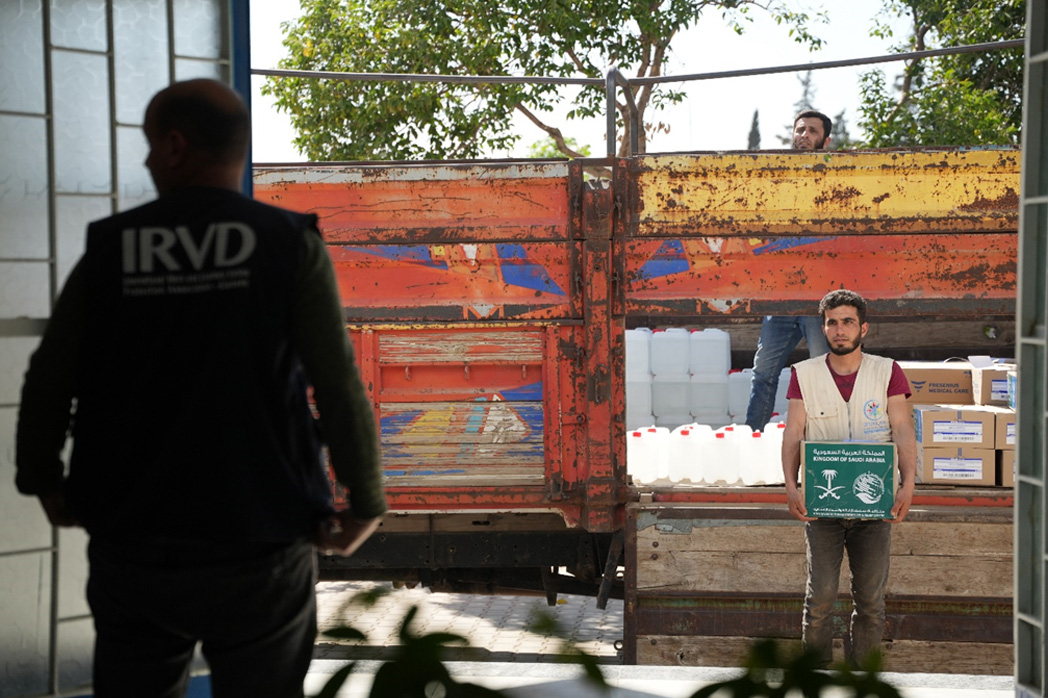22 September 2025, Idlib, Syrian Arab Republic – At Ibn Sina Dialysis Centre in Idlib, 65-year-old Hassan Al-Sattoof settles into his chair for yet another dialysis session. The routine has defined his weeks for 2 years, but for him, it is not routine at all.
 Medical supplies supported by KSrelief are delivered to Al-Ameen Dialysis Centre to keep treatments running. Photo credit: WHO“My kidneys are failing, so this is my lifeline,” Hassan says. “Each week I come 3 times, and I sit here for hours. If dialysis stops, my life stops. We are about 200 patients in this centre, and all of us are the same – we wait, we hope, and we pray that the supplies continue. Without them, some would be forced to travel far for treatment, and others could see their health deteriorate rapidly.”
Medical supplies supported by KSrelief are delivered to Al-Ameen Dialysis Centre to keep treatments running. Photo credit: WHO“My kidneys are failing, so this is my lifeline,” Hassan says. “Each week I come 3 times, and I sit here for hours. If dialysis stops, my life stops. We are about 200 patients in this centre, and all of us are the same – we wait, we hope, and we pray that the supplies continue. Without them, some would be forced to travel far for treatment, and others could see their health deteriorate rapidly.”
In Qah, 55-year-old Abdulrazzaq Al-Shahhad has been receiving dialysis at Al-Hadiya Hospital for 5 years. Displaced from his home in eastern Maarat, he knows exactly what it would mean if the support ended.
“Each dialysis session costs about US$ 50 if you have to buy the materials yourself,” he explains. “I need 3 sessions a week. That’s more than US$ 600 a month – impossible for me or anyone here to afford. Before, I sometimes had to borrow money to buy the filters, and I would choose between provisions and treatment. Now, the hospital provides everything I need without cost at the point of care. If this help stops, we lose everything – not just our health, but our dignity.”
 A patient receives dialysis at a centre in Afrin, with KSrelief-supported supplies ensuring continuity of care. Photo credit: WHOBy the end of June, WHO procured and distributed 30,000 dialysis treatment courses to centres across Idlib and Aleppo. This covers the needs of 1,476 patients – almost 20% more than initially projected, as demand continues to rise. The project has allowed more patients to reach treatment, ensured dialysis machines keep running and helped clinics continue their work without interruption despite economic hardships.
A patient receives dialysis at a centre in Afrin, with KSrelief-supported supplies ensuring continuity of care. Photo credit: WHOBy the end of June, WHO procured and distributed 30,000 dialysis treatment courses to centres across Idlib and Aleppo. This covers the needs of 1,476 patients – almost 20% more than initially projected, as demand continues to rise. The project has allowed more patients to reach treatment, ensured dialysis machines keep running and helped clinics continue their work without interruption despite economic hardships.
Ibrahim Al-Dhanab, who also lives in Idlib, comes twice a week for his treatment. The long hours connected to the machine leave him exhausted, but he insists he cannot miss a session.
“After dialysis I feel weak, sometimes I can hardly walk home,” Ibrahim says. “But missing even one session could be the end for me. What gives me strength is knowing I can keep going for my children. If the centre stopped working, families like mine would have no chance. We hold on because of this support.”
“I see that Syria is starting to change, and that gives me hope,” Ibrahim adds. “But for people like me, treatment must not stop during this time. Dialysis keeps us alive. I wish that patients in every part of the country could find the same care that I receive here – because no one should lose their life just because they cannot reach a hospital.”
This continuity of care is made possible through the generous support of the King Salman Humanitarian Aid and Relief Centre (KSrelief). Working with WHO, KSrelief’s contribution has been vital in ensuring that dialysis patients across Idlib and northern Aleppo receive lifesaving treatment free of charge.
Syria is at a critical juncture, moving from 14 years of conflict towards early recovery and stabilization. WHO is combining life-saving humanitarian action with longer-term recovery efforts, making health a stabilizing force that can support returns and peacebuilding. For Hassan, Abdulrazzaq, Ibrahim and more than 1,400 others, dialysis is more than a treatment – it is survival, and the hope of another tomorrow.








